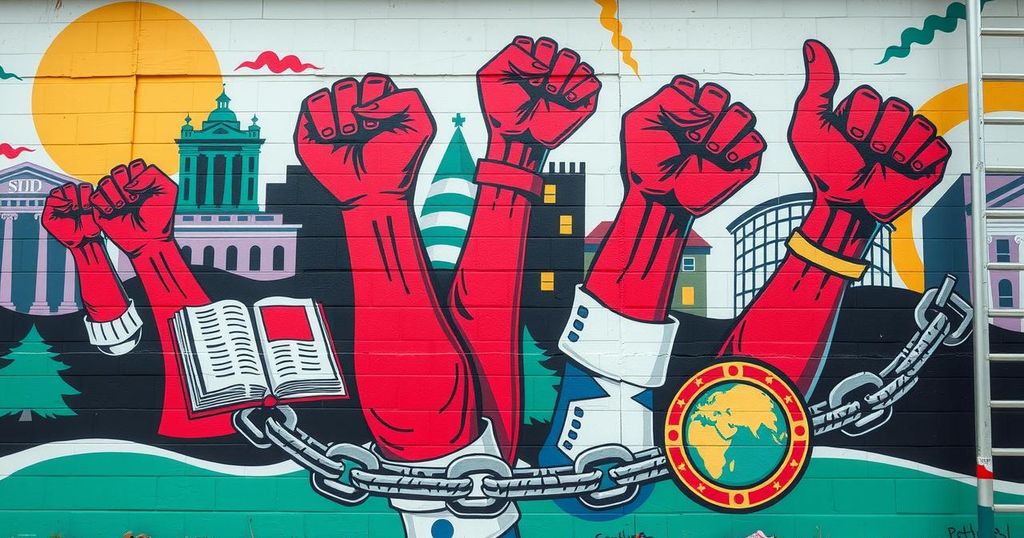Brazil’s student movement has consistently resisted far-right ideologies, mobilizing against Jair Bolsonaro’s administration since 2019. At their recent congress, student activists united to devise strategies against the far right, reflecting on historical struggles and setting a platform for contemporary issues such as anti-racism and climate justice. Their endeavors highlight a commitment to political engagement and the importance of collective action in the fight for justice, both nationally and globally.
Brazil’s student movement has demonstrated notable resilience against the far right, significantly shaping its political landscape. In response to the election of former President Jair Bolsonaro in January 2019, student activists organized the “Tsunami” protests in May to defend higher education against budget cuts. This foundational resistance has persisted, aligning with broader global anti-far right sentiments, particularly in the face of current president Luiz Inácio Lula da Silva’s struggles and Donald Trump’s recent political resurgence.
One of the key gatherings for this movement is the Biennial of the National Student Union (UNE), which convenes student leaders for collective deliberation on political engagement. This year’s conference attracted thousands to discuss strategies against the far right, showcasing the vital intersection of youth activism and contemporary political challenges, while simultaneously honoring historical sacrifices, such as that of Edson Luis, a student martyr of the past dictatorship.
Brazilian student organizations have been active opponents of the far right since their founding. The UNE, established in 1937, became a target during the 1964 military dictatorship, with swift repression against activists. Over decades, brave students organized under severe threats, culminating in significant protests—a testament to their enduring spirit in advocating for democracy and social justice amidst adversity.
The current student movement reflects a diverse agenda, fueled by affirmative action and inclusive policies. Activists now frame their resistance against neoliberal policies within broader contexts, incorporating feminist, anti-racist, anti-capitalist, and environmentalist struggles. This evolution demonstrates a adaptive approach to contemporary challenges while remaining steadfast against systemic oppression.
During the latest congress, where nearly 10,000 students convened, there was a palpable urgency reflected in their mobilization against both domestic and international far-right threats. Students chanting “No amnesty!” underscored their commitment to justice for victims of past regimes, while also addressing a contemporary coup attempt informed by Bolsonaro’s allies, highlighting the chilling realities of their political context.
Dissonance exists within these movements regarding the formation of a united left, as varied ideological perspectives lead to debates on approach and strategies. Some factions advocate for cooperation with the governing body, while others emphasize the need to critique and challenge prevailing policies, indicating vibrant discourse within student circles on how best to confront the challenges posed by the far right.
Furthermore, students are recognizing their struggles within a global framework, resonating with transnational movements against the far right. During this period, the issues of anti-racism and ecological justice have taken precedence, whereby students have prioritized international accountability, particularly regarding ongoing crises in the Global South, including the climate crisis and global migration challenges.
As they strategize to carve pathways of resistance against rising authoritarianism, Brazilian students are engaged in a multifaceted battle that seeks to strengthen both their domestic objectives and the global fight against oppression. The commitment expressed through their activism, accompanied by calls for unity and critical engagement with present-day policies, resonates deeply within their historical context, symbolizing hope and determination for the future.
In summary, Brazil’s student movement stands as a formidable force against the far right, drawing upon a rich history of activism and resilient strategies. The recent congresses illustrate their commitment to addressing not only local issues but also broader global injustices through diverse and intersectional approaches. As they navigate the political challenges posed by shifting regimes and socio-economic disparities, these students are committed to organizing for equity and justice, ensuring their voices are integral in shaping Brazil’s political future and augmenting the global fight against oppression.
Original Source: nacla.org




